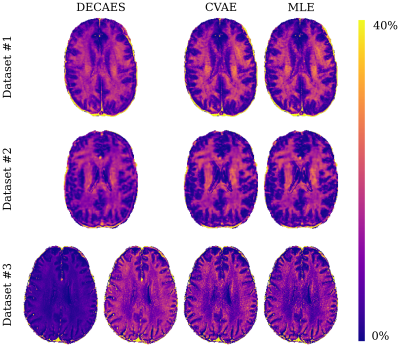Jonathan Doucette1,2, Christian Kames1,2, Christoph Birkl3, and Alexander Rauscher1,2,4,5
1UBC MRI Research Centre, Vancouver, BC, Canada, 2Physics & Astronomy, University of British Columbia, Vancouver, BC, Canada, 3Neuroradiology, Medical University of Innsbruck, Innsbruck, Austria, 4Radiology, University of British Columbia, Vancouver, BC, Canada, 5Pediatrics, University of British Columbia, Vancouver, BC, Canada
1UBC MRI Research Centre, Vancouver, BC, Canada, 2Physics & Astronomy, University of British Columbia, Vancouver, BC, Canada, 3Neuroradiology, Medical University of Innsbruck, Innsbruck, Austria, 4Radiology, University of British Columbia, Vancouver, BC, Canada, 5Pediatrics, University of British Columbia, Vancouver, BC, Canada
We demonstrate that rapid $$$T_2$$$ analysis under Rician noise assumptions is possible using a methodology which utilizes a deep learned initial guess for a subsequent maximum likelihood estimation procedure. Generalization to out-of-distribution datasets demonstrated.

Figure 3: Representative slices of MWF maps resulting from parameter inference using DECAES, MLE, and CVAE. Both CVAE and MLE are able to produce high quality MWF maps for all datasets, despite being trained only on simulated data. In dataset #3, DECAES fails to properly estimate the MWF when using the default refocusing control angle. This can be manually corrected (adjacent), but no such issue occurs for CVAE or MLE which estimate the refocusing control angle directly.

